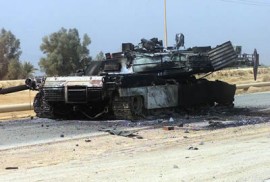
The reports of the massacre in Haditha are the definition of a shock but not a surprise. Some US marines deployed in Iraq are killed by a roadside bomb and their surviving colleagues go on the rampage in the neighbourhood, leaving 24 Iraqi civilians dead.
The news of this has developed only slowly. The first reports in November last year were of a firefight. It took time for the truth to emerge. This too is not surprising. The Americans lost no time after the capture of Saddam Hussein in his hole to announce “We got him!” To take longer to admit that something has gone wrong is only human nature, and I suppose human nature is the subject of this blog entry (if not of the whole website).
The alleged perpetrators of the massacre are to be subject to criminal investigation and possible trial for murder. A war that was fought to put an end to the arbitrary killing of civilians by the authorities cannot tolerate the same behaviour by its own soldiers. But one needs to think a little more about the position those soldiers found themselves in.
In the aftermath of an attack, in fear for their own lives, under extraordinary pressure, who can be sure they would not have reacted differently? A violent environment encourages violent behaviour. An analysis of homicide rates in the United States showed that they rose after heavyweight boxing matches, and experimental psychology has demonstrated how individuals are stirred to greater violence by objective circumstances. This is human nature.
I remember once discussing this problem with a British army officer who had been part of the invasion force in Iraq, and he was much less tolerant that I had imagined. It was a loss of discipline, he said, which in turn puts fellow soldiers at risk, even before one thinks of the unacceptable consequences undermining the objectives of the whole military operation.
But it takes a highly developed military culture to work like this, and even then there will be mistakes and errors. Bad things are going to happen in wartime. It cannot be sanitised.
Michaal Ignatieff, in his book “Virtual war”, starts to worry about idea of a clean war. If war becomes too easy, the danger is that we become too ready to fight it.
His starting point is the reflection that the Kosovo war was fought without a single Nato casualty. There were plenty of victims of the Nato bombing, of course, both in uniform and not, but from the side of the bombers the war was not so far different from an extended training exercise. This is a shocking way to put things, I realise, but that is how unequal was the struggle. The cost to Nato was not lives but merely money. That is the way that any other kind of government policy is judged: there is a danger that war becomes treated as just another kind of government policy.
Even the methods of warfare are becoming “normal”. What is the difference between a Predator operator at his base in Arizona steering his pilotless plane across the sky of Afghanistan or Yemen, and his schoolfriend playing a computer game? The US army has even created an online game as a promotional and recruitment tool of its own.
I find all this rather sordid. There is a profound difference between war and its computerised simulations, and that distinction should not be blurred. War is indeed hell, which is why I am opposed to war.
